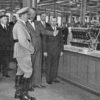The origins of Porsche, one of the most iconic car brands in the world, have long been shrouded in controversy and speculation. One of the most persistent rumors is that Porsche was created by Nazis during World War II. While it is true that Ferdinand Porsche, the founder of the company, had close ties to the Nazi regime, the story is far more complex than that.
Ferdinand Porsche was a talented engineer who had already made a name for himself in the automotive industry before the rise of the Nazis. In the 1920s and 1930s, he was known for his innovative designs and technical expertise. His collaboration with Adolf Hitler and the Nazi party came about when Hitler commissioned him to design a car that would be affordable for the average German, leading to the creation of the Volkswagen Beetle.
While Ferdinand Porsche did work closely with the Nazis, it is important to remember that many German companies and individuals were forced to collaborate with the regime during this time. The political climate of the era meant that refusing to work with the Nazis was not an option for most people. Additionally, the success of Volkswagen and the Beetle played a significant role in securing the future of the Porsche brand.
After the war, Ferdinand Porsche faced accusations of war crimes and was imprisoned for a brief period. However, he was never convicted, and upon his release, he returned to his passion for designing and manufacturing high-performance sports cars. This led to the creation of the first Porsche sports car, the Porsche 356, in 1948.
Today, Porsche is known for its luxury and high-performance vehicles, and the company has distanced itself from its controversial past. While it is true that the origins of Porsche are entwined with the Nazi regime, it is essential to understand the full context of the company’s history and the contributions of its founder in order to have an accurate understanding of its origins.
Porsche: A World-Renowned Car Brand
Porsche is a world-renowned car brand that has become synonymous with luxury, performance, and innovation. Founded in 1931 by Ferdinand Porsche, the company has a rich history and a legacy of producing iconic sports cars that are revered by car enthusiasts around the globe.
Known for its distinctive design and exceptional engineering, Porsche has consistently pushed the boundaries of automotive technology. The brand’s commitment to precision and craftsmanship is evident in every car they produce, from the iconic 911 to the luxurious Panamera.
One of the key factors that sets Porsche apart from other car brands is its racing heritage. The company’s success in motorsports has not only solidified its reputation as a top-tier manufacturer but has also fueled innovation and advancements in car technology. Porsche’s dedication to motorsports can be seen in the numerous victories and championships they have achieved over the years.
In addition to its performance-focused sports cars, Porsche also offers a range of SUVs that combine comfort and practicality with the brand’s signature style and performance. These SUVs, such as the Cayenne and Macan, have helped Porsche expand its market reach and attract a wider range of customers.
With a commitment to sustainability, Porsche is also actively working towards reducing its environmental impact. The brand has introduced hybrid and electric models, such as the Taycan, which showcase Porsche’s dedication to embracing new technology while maintaining its commitment to performance.
Overall, Porsche has established itself as a world-renowned car brand through its combination of design, engineering, performance, and racing heritage. With each new model, the company continues to push boundaries and redefine what is possible in the world of automotive excellence.
A Legacy of Performance and Engineering Excellence
The Porsche brand has a rich history and a legacy of performance and engineering excellence. From its inception, Porsche has been known for its innovative designs, superior craftsmanship, and exceptional driving experience. The company’s commitment to pushing the boundaries of automotive engineering has made it one of the most respected and sought-after brands in the world.
Since its founding in 1931 by Ferdinand Porsche, the company has been at the forefront of automotive innovation. Porsche’s early creations, such as the iconic Porsche 356 and the groundbreaking Porsche 911, set the standard for sports car performance and design. These cars epitomize Porsche’s commitment to delivering a thrilling driving experience combined with precision engineering.
Porsche’s obsession with perfection and attention to detail can be seen in every aspect of their vehicles. From the aerodynamic body designs to the powerful engines and advanced suspension systems, every component is meticulously crafted to enhance performance and ensure an exhilarating driving experience.
The engineering excellence of Porsche can be witnessed on the racetracks around the world. Porsche has a long and storied history in motorsport, with numerous victories in prestigious races such as the 24 Hours of Le Mans and the Formula One World Championship. These achievements are a testament to Porsche’s dedication to pushing the boundaries of performance and demonstrating the capabilities of their vehicles.
Today, Porsche continues to innovate and evolve, embracing new technologies such as hybrid and electric powertrains while staying true to its core values of performance and engineering excellence. With models like the Porsche Taycan, the company is leading the way in sustainable performance and setting new benchmarks for the future of automotive engineering.
In conclusion, the Porsche brand is synonymous with performance and engineering excellence. With a rich history and a commitment to pushing the boundaries of automotive innovation, Porsche continues to deliver exceptional driving experiences and remains one of the most iconic and respected brands in the world.
The Intriguing History of Porsche
The history of Porsche is a captivating tale that spans over 80 years and is filled with innovation, success, and a passion for engineering excellence. It all began in 1931, when Ferdinand Porsche founded his own engineering office in Stuttgart, Germany. With a background in automotive engineering and a keen eye for design, Porsche set out to create a brand that would revolutionize the world of sports cars.
One of the most iconic models to come out of Porsche’s early years was the Porsche 356. Introduced in 1948, this sleek and stylish sports car captured the imagination of car enthusiasts around the world. With its rear-engine layout and lightweight construction, the 356 offered an exhilarating driving experience that set it apart from its competitors.
In the 1960s, Porsche once again made waves in the automotive world with the introduction of the legendary Porsche 911. This iconic sports car, with its distinctive silhouette and powerful performance, quickly became a symbol of speed and luxury. The Porsche 911 has since become one of the most recognizable and beloved sports cars in the world, with a cult-like following of enthusiasts.
Over the years, Porsche has continued to innovate and push the boundaries of automotive engineering. In 1978, they introduced the groundbreaking Porsche 928, a grand tourer that combined luxury and performance in a stylish package. In the 1990s, Porsche expanded its lineup with the introduction of the Boxster and later the Cayenne, marking their entry into the SUV market.
Today, Porsche stands as a symbol of automotive excellence, with a reputation for producing high-performance sports cars and luxury vehicles. With models like the 911, Cayman, Panamera, and Macan, Porsche continues to captivate car enthusiasts around the world with their cutting-edge technology, precision engineering, and timeless design.
From its humble beginnings as a small engineering office to its status as a global luxury brand, the history of Porsche is a testament to the vision, ingenuity, and passion of its founder, Ferdinand Porsche, and the talented team of engineers and designers who have carried his legacy forward. Whether on the racetrack or the open road, Porsche continues to inspire and thrill drivers with their unwavering commitment to performance and craftsmanship.
The Origins of Porsche
The origins of Porsche can be traced back to the early 20th century in Germany. The company was founded by Ferdinand Porsche, an Austrian engineer and automobile designer. Ferdinand Porsche had a long and successful career in the automotive industry, working for various companies before establishing his own.
In 1931, Ferdinand Porsche founded his own engineering office, which later became known as Porsche AG. The company initially focused on offering automotive consulting and engineering services to other manufacturers. However, it was not long before Ferdinand Porsche decided to create his own cars.
One of the first notable projects of Porsche AG was the development of the Volkswagen Beetle. The German government commissioned Ferdinand Porsche to design a car that would be affordable for the average citizen. The Beetle became a huge success and is still considered an iconic car to this day.
During World War II, Porsche AG was involved in the production of military vehicles for the German army. The company manufactured tanks, armored cars, and other military equipment. It is important to note that Ferdinand Porsche himself was a member of the Nazi party and had close ties to the German government at the time.
After the war, Ferdinand Porsche was briefly imprisoned for his involvement with the Nazi regime. However, he was released and went on to continue his work in the automotive industry. Porsche AG resumed producing cars, and in 1948, the first Porsche sports car, the Porsche 356, was introduced to the market.
Today, Porsche is a renowned luxury automobile manufacturer known for its high-performance sports cars. The company has come a long way since its beginnings and continues to innovate and push the boundaries of automotive engineering.
Founder Ferdinand Porsche
Ferdinand Porsche was the founder of the Porsche brand and is considered one of the most influential automotive engineers of the 20th century. He was born on September 3, 1875, in Maffersdorf, Austria-Hungary (now Vratislavice nad Nisou, Czech Republic).
From a young age, Porsche showed a keen interest in mechanical engineering. He started his career working for various companies in the automotive industry, gaining valuable experience and knowledge along the way. In 1931, he founded his own engineering office, which later evolved into the renowned Porsche brand.
Porsche’s innovative designs and engineering prowess quickly gained recognition in the automotive world. One of his notable achievements was the development of the Volkswagen Beetle, also known as the “People’s Car.” The Beetle became a symbol of affordable and reliable transportation for the masses.
During World War II, Porsche’s engineering expertise was utilized by the Nazi regime. His firm, Porsche GmbH, was involved in the development of military vehicles, including the Tiger I tank and the Kübelwagen. While Porsche himself was not a member of the Nazi Party, his close association with the regime has raised questions and controversy about his involvement.
After the war, Ferdinand Porsche faced scrutiny and was briefly imprisoned by the French authorities. However, he was released due to his ill health. He resumed his work in the automotive industry and focused on designing and producing sports cars under the Porsche brand. One of his most iconic creations was the Porsche 911, which remains a symbol of performance and engineering excellence to this day.
Ferdinand Porsche’s legacy as a pioneering engineer and entrepreneur continues to shape the automotive industry. His commitment to innovation and his contributions to the world of sports cars have left an indelible mark on the history of automobiles.
From Engineering Genius to Controversial Figure
Ferdinand Porsche, the founder of the Porsche automobile company, was not only an engineering genius but also a controversial figure. His contributions to the automotive industry are undeniable, but his involvement with the Nazi party during World War II has cast a shadow over his legacy.
Porsche’s automotive career began in the early 20th century, when he worked for several well-known companies, including Austro-Daimler and Mercedes-Benz. His innovative designs and technical expertise quickly gained him recognition, and he became known for his ability to create high-performance vehicles.
However, it was during his time with the Nazi party that Porsche’s reputation became tarnished. He joined the party in 1937 and was appointed as the head of the German Labor Front’s automotive department. This position allowed him to work closely with the Nazi regime and develop vehicles that would support their war efforts.
One of Porsche’s most notable projects during this time was the development of the Volkswagen Beetle, which was intended to be an affordable car for the German people. The Beetle became a symbol of Nazi Germany and was heavily promoted by the regime. Porsche’s involvement in the project raised questions about his ethics and the extent of his collaboration with the Nazis.
After the war, Porsche faced criticism for his associations with the Nazi party. He was briefly imprisoned, but ultimately released due to a lack of evidence of his direct involvement in war crimes. However, his reputation had been damaged, and he spent the rest of his life trying to distance himself from his Nazi connections.
Despite the controversy surrounding Porsche’s past, his contributions to the automotive industry cannot be ignored. His innovative designs and engineering prowess laid the foundation for the success of the Porsche brand, which is now synonymous with luxury and performance. Today, Porsche is celebrated for its sleek and powerful sports cars, but the history of its founder remains a complex and controversial topic.
The Volkswagen Connection
In addition to his work on the Porsche sports car, Ferdinand Porsche was also involved in the development of the Volkswagen Beetle. In the 1930s, Adolf Hitler commissioned Porsche to design a “people’s car” that would be affordable for the average German citizen. This led to the creation of the Volkswagen Beetle, which was initially produced by the German Labour Front.
During World War II, production of the Volkswagen Beetle was ramped up to support the German war effort. The car was used by the German military and played a role in the transportation of troops and supplies. Ferdinand Porsche and his team also worked on other military vehicles, including tanks and armored cars.
After the war, the British took control of the Volkswagen factory and restarted production of the Beetle. The car became popular worldwide and eventually became one of the best-selling cars of all time. The success of the Volkswagen Beetle helped to establish the Volkswagen brand as a global automotive powerhouse.
The connection between Porsche and Volkswagen continues to this day. The Porsche brand is now a subsidiary of Volkswagen AG, and the two companies share technology and resources. Many Porsche models, such as the Cayenne and Macan SUVs, are built on Volkswagen platforms. This partnership has allowed both companies to benefit from their shared expertise and has helped to ensure the continued success of the Porsche brand.
Nazi Germany and Porsche
The history of Porsche and its connection to Nazi Germany is a complex and controversial topic. While it is true that Ferdinand Porsche, the founder of the company, had close ties to the Nazi regime, it is important to understand the context in which these connections were formed.
In the 1930s, Germany was under the control of Adolf Hitler and the Nazi Party. The Nazis had a vision of creating a new Germany, one that would be powerful and technologically advanced. This vision included the development of a “people’s car,” or Volkswagen, that would be affordable for the average German citizen.
Ferdinand Porsche was approached by the Nazis to help design and produce this Volkswagen. He agreed to the project and founded Porsche Konstruktionen GesmbH, which later became known as Porsche AG. The company was tasked with developing the prototypes and overseeing the production of the Volkswagen.
During this time, Porsche also worked on other projects for the Nazi regime, including the development of military vehicles and tanks. It is important to note that many German companies had similar contracts with the Nazis during this period, as they were required to support the war effort.
While Porsche’s involvement with the Nazis cannot be denied, it is also important to recognize that he was not a member of the Nazi Party and his main focus was on engineering and design. After World War II, Porsche faced scrutiny for his connections to the Nazi regime, but he was never charged with any war crimes or crimes against humanity.
Today, Porsche is known as a prestigious and successful automobile manufacturer. The company has distanced itself from its controversial past and has become a symbol of luxury and performance. However, the history of Porsche and its ties to Nazi Germany will always be a part of its legacy.









